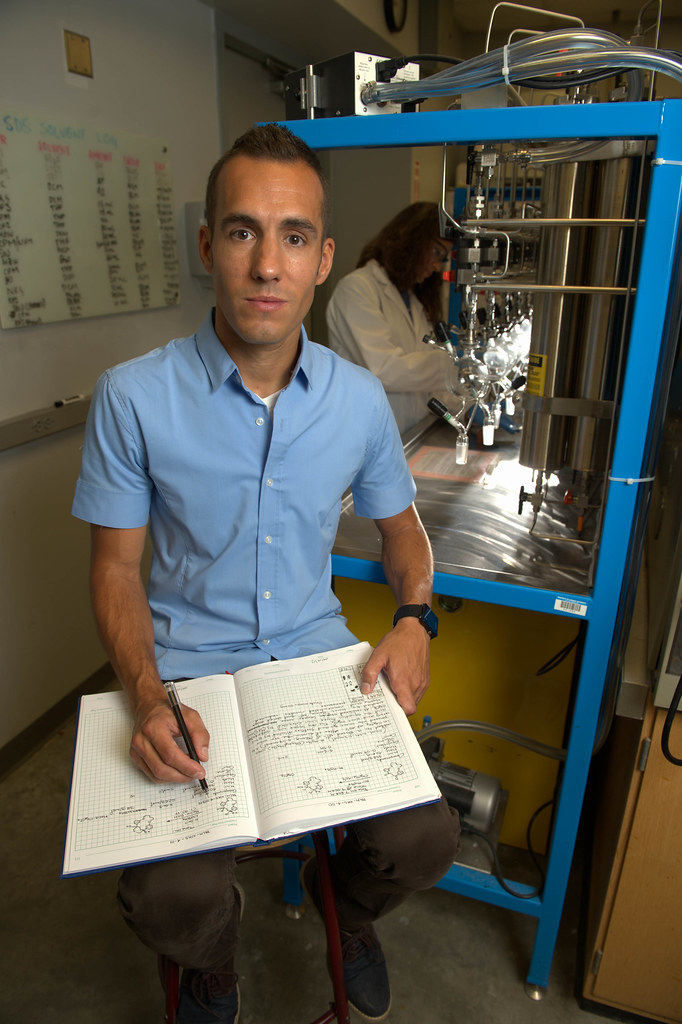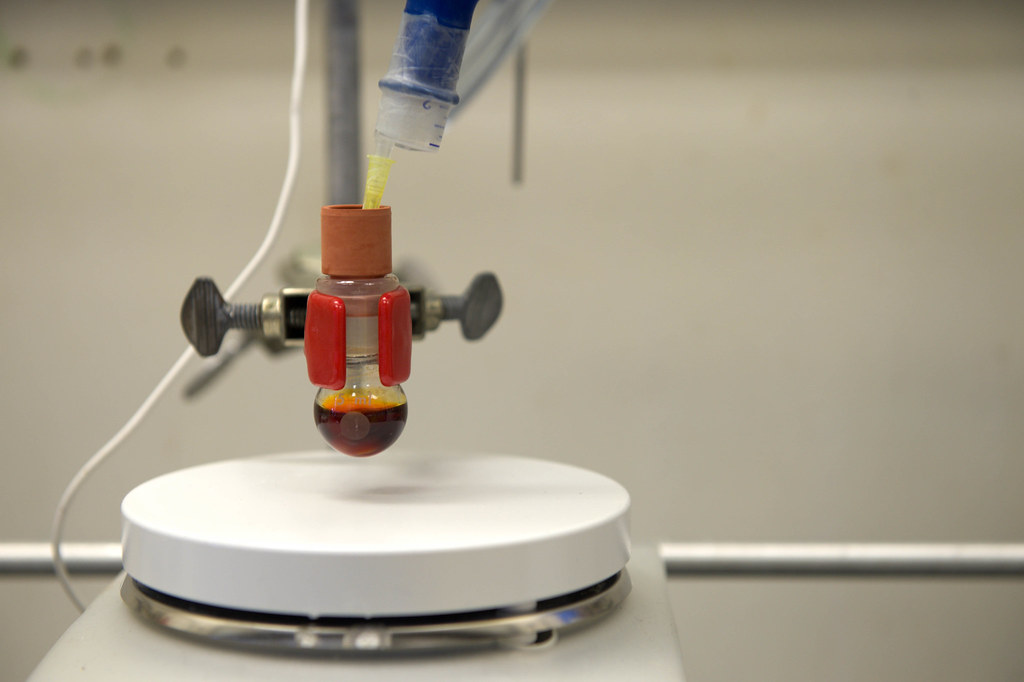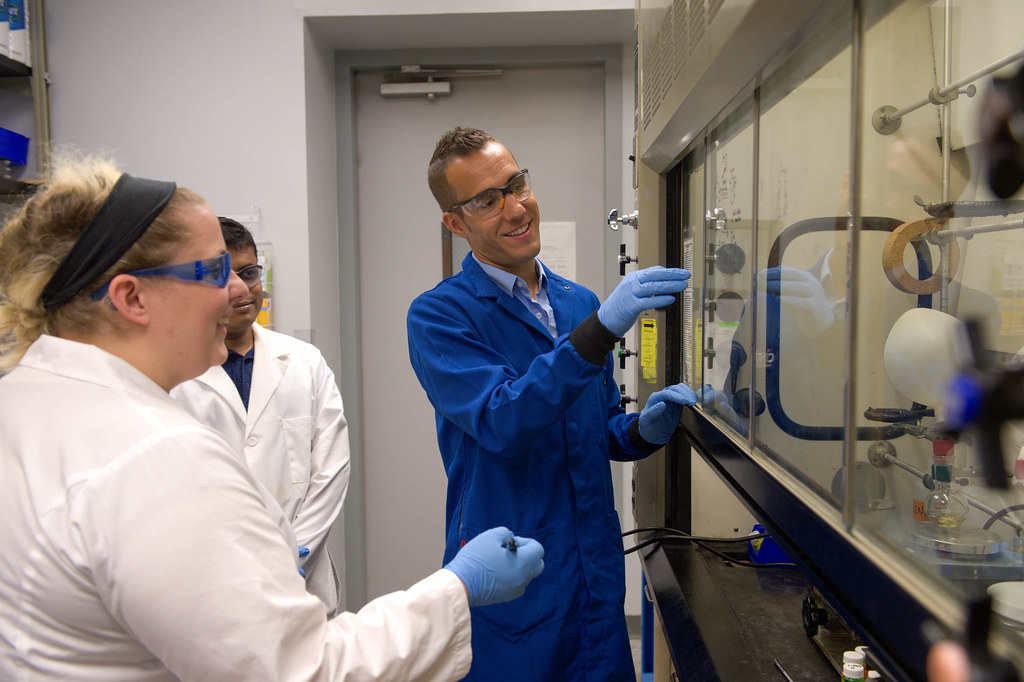COSAM News Articles 2017 September Playing molecular Lego: Merner explores the complex architecture and construction of creating carbon nanotubes
Playing molecular Lego: Merner explores the complex architecture and construction of creating carbon nanotubes
Bradley Merner, the James E. Land Assistant Professor of Chemistry, received a five-year, $700,000, National Science Foundation Early Career Development, or CAREER, Award for his proposal titled, “Functionalized Bent para-Phenylenes: New Strategies and Tools for the Synthesis of Carbon Nanotubes.”
The NSF Faculty Early Career Development, or CAREER, program is a foundation-wide activity that offers the National Science Foundation's most prestigious awards in support of junior faculty who exemplify the role of teacher-scholars through outstanding research, excellent education, and the integration of education and research within the context of the mission of their organizations.
“This CAREER Award from the National Science Foundation has enabled my research group to work in a very exciting area of chemical synthesis over the next 5 years,” said Merner.
The funding will allow two doctoral students, Nirmal Mitra and Caroline Merryman, to dedicate 100 percent of their efforts toward assisting Merner in the development of new strategies for the controlled synthesis of carbon nanotubes.

Bradley Merner, the James E. Land Assistant Professor of Chemistry, received a National Science Foundation Early Career Development Award for his proposal titled, “Functionalized Bent para-Phenylenes: New Strategies and Tools for the Synthesis of Carbon Nanotubes.”
Carbon nanotubes were discovered in 1991, and today they have broad applications in materials science, engineering, and biological sensing. They are used in batteries, dental implants, electronics, cancer detection, biological and biomedical research, drug discovery, water filtration, and more. The applications, although broad, are still limited due to complexities inherent in the construction of carbon nanotubes.
Currently, scientists are trying to create carbon nanotubes by synthesizing benzene rings, stacked one on top of the other, using a bottom-up approach, to form a cylindrical network of carbon atoms – a carbon nanotube.
Complications stem primarily from benzene’s resistance to adapting to a cyclical molecular structure, which has led to great difficulties in synthesizing these materials in a controlled manner. The current state-of-the-art for carbon nanotube synthesis leads to mixtures of non-uniform materials.
The inability to construct uniform carbon nanotubes limits the possibilities and full potential of applications for usage, especially as it relates to advances in materials science and engineering research, where structurally uniform tubes are required.
“These hexagons (molecules) can be thought of as a sheet of plywood,” said Merner. “It is really hard to bend a sheet of plywood. Similarly, it is hard to bend benzene rings. Like bending plywood, a lot of strain and potential energy is built into the benzene ring, which can be released through a chemical reaction or transformation. So, we have to be careful not to ruin the hoop-like structure that we have formed. Typically, these compounds can succumb to rearrangement reactions, resulting in fragmentation and decomposition.”
Merner’s group is seeking to discover more effective and efficient methods for constructing carbon nanotubes by building smaller sections of carbon nanotube that can be assembled into larger components of carbon nanotubes in a systematic way.

The NSF Early Career Development Award will allow two of Merner’s doctoral students, Nirmal Mitra and Caroline Merryman, to dedicate 100 percent of their efforts toward assisting him in the development of new strategies for the controlled synthesis of carbon nanotubes.
“It’s like molecular Lego,” said Merner. “The idea is to take atoms, molecules, and the electrons that are associated with those atoms and molecules, and bring them together in a way that will allow us to access pure material.”
“One of the biggest challenges to discovering new applications for carbon nanotubes and pushing them forward is access to pure material. What chemists like me and my group are trying to do is come up with controlled and selective chemical syntheses of these materials, which requires the development of methodology, strategies, and protocols that can ultimately lead to the synthesis of one type of nanotube. I think that once our group, or other groups—and there are several groups around the world working towards the synthesis of carbon nanotubes—develops the technology for synthesizing these materials, we can really start moving forward with the applications of carbon nanotubes.”

Merner’s group is seeking to discover more effective and efficient methods for constructing carbon nanotubes by building smaller sections of carbon nanotube that can be assembled into larger components of carbon nanotubes in a systematic way.
In addition to the research function of the grant, Merner is developing an educational component involving the development of chemical synthesis-teaching modules that are offered to rising junior and senior high school students in the Southeast who participate in the College of Sciences and Mathematics’ Summer Science Institute. Underrepresented, undergraduate students will also have an opportunity to participate in a graduate-level, chemical synthesis, summer research program, and students enrolled in the honors organic chemistry course at Auburn will synthesize materials used in research efforts in the Merner lab.
“We are able to offer students a cutting-edge chemistry experience,” said Merner. “Students are learning about chemistry that is really at the frontier of chemical synthesis. They are learning the techniques necessary for graduate school, and they are learning how to think through problems.”
Merner has six doctoral graduate students in his lab, including Mitra and Merryman, as well as Kara Johnson, Sydney Jackson, Ana Dmytrejchuk and Nirob Saha.
For more information on Merner’s lab, visit his website.
Latest Headlines
-
02/12/2025
-
02/11/2025
-
02/10/2025
-
01/30/2025
-
12/03/2024
